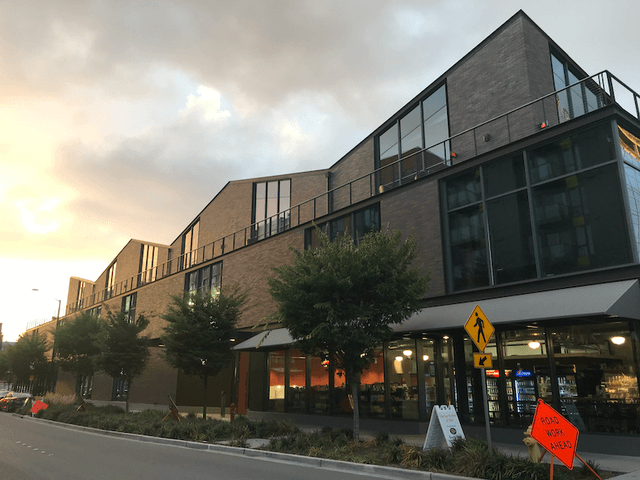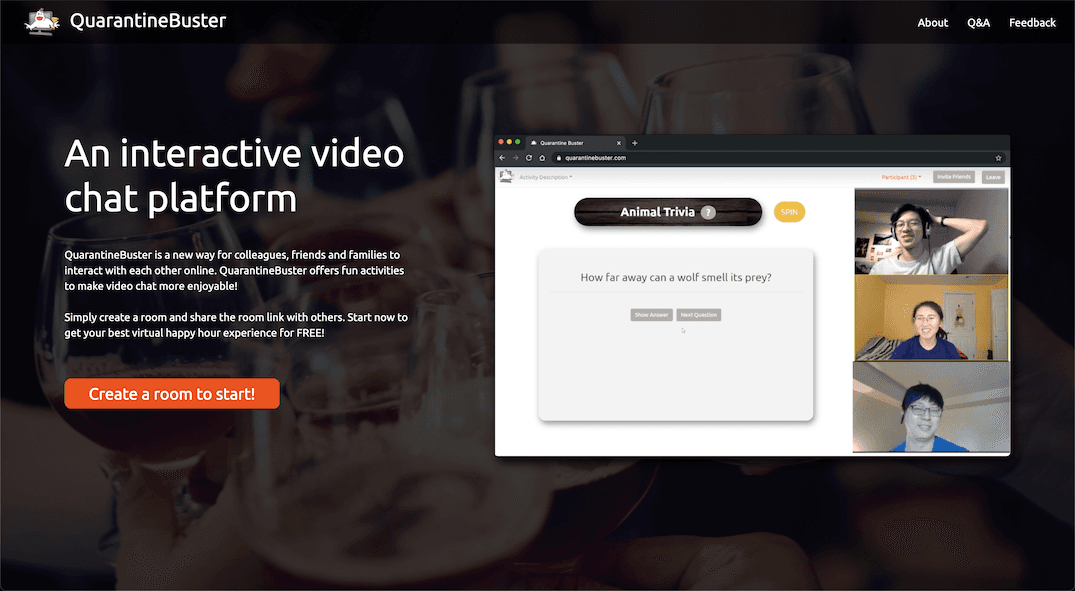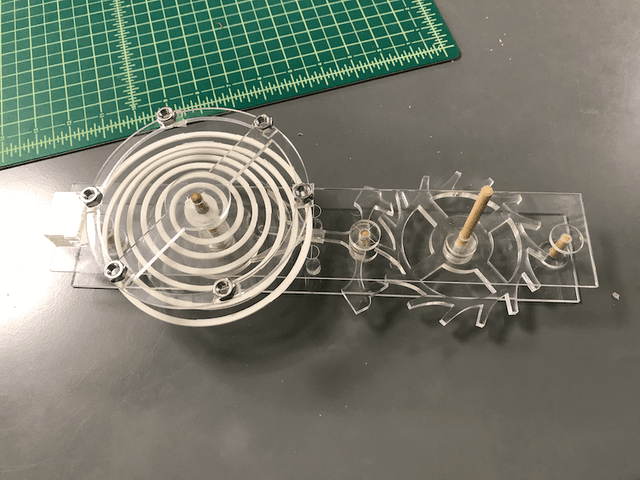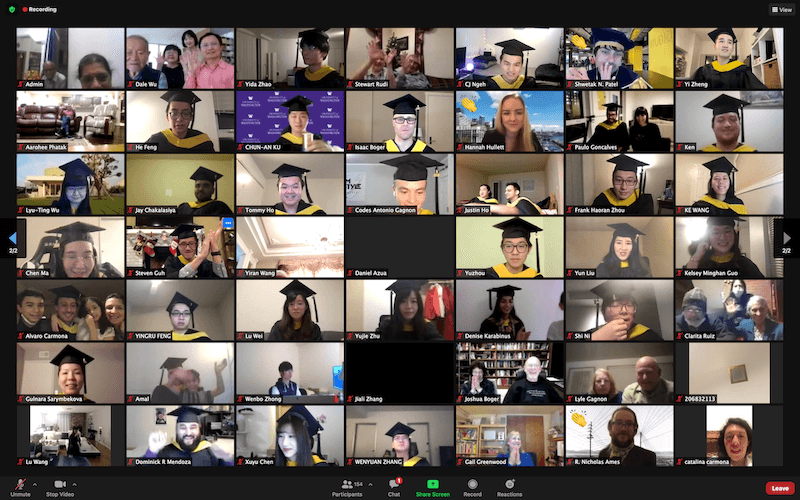- Published on
UW GIX Master's in Technology Innovation - Cross-Disciplinary Master's Experience in Tech, Design, Business
- Authors

- Name
- Joey Wang 王斯右
- @joeysywang
This post is translated by ChatGPT, so take it with a grain of salt
Intro
I graduated in March 2021, obtaining my master's degree. The full name of the degree is:
- University of Washington (referred to as UW)
- Global Innovation Exchange (referred to as GIX)
- Master of Science in Technology Innovation (referred to as MSTI)
Each word in the name is easy to understand, but when combined, it becomes somewhat confusing. I believe everyone has two reactions when they see such a fancy name: first, "Cool!", and second, "What on earth is this?"
As an alumnus who graduated from here, I wrote this article to reflect on my 15 months and hopefully to help:
- Those who are planning to study abroad and are looking for related programs.
- People who simply want to understand more about GIX.


(left:gix building right: snowman)
What is GIX?
Video Introduction
GIX is a college jointly established by UW, Microsoft, and Tsinghua University in Beijing. Microsoft is like a patron, providing funding for the building and many resources, while Tsinghua University offers its own dual-degree program. The core of GIX is still the MSTI program at UW. We are not located on UW's main Seattle campus but across a bridge in Bellevue, about a half-hour drive away, forming a distinct college. The geographical location in Bellevue is quite good, near Microsoft's headquarters in Redmond to the north, right next to the newly built Facebook office, and downtown with many tech companies (Amazon, Expedia, Valve, etc.) having offices.
As an "innovation college," what does GIX teach? The mission and vision stated on the official website are:
Our mission is to build talent that leverages emerging technologies in new and impactful ways. Simply put, it's about creating impact with innovative technologies. The operation of this can be understood from GIX's slogan: Design, Build, Launch, which is the basic cycle of a technology product or solution:
- Design: Identifying, finding, and analyzing problems
- Build: Developing solutions
- Launch: Finally, releasing it into the market for practical application
This slogan is directly linked to the three main areas we study: Design, Technology, and Business.
- Design: UX/UI design, Design thinking, User research...
- Technology: Software, hardware, Machine learning, data...
- Business: Strategy, accounting, finance...
There are also other general education courses like the History of Technology, Corporate Law, Team Building... The website has detailed course content, which might change every year, so the official information is the most accurate.
**In addition to classes, another important part is the Project.*jj* Projects require more time than classes. We have five quarters in total (one quarter is about three months), and there are project classes in the last four quarters, including two one-semester projects and one two-semester Launch project. This degree does not require a thesis, so the Launch project is our graduation requirement. The design of these projects aims to allow us to apply what we learn in class to the projects.

Fifteen-Month Journey
GIX is a very new program. I enrolled in 2019 as part of the third cohort. Each cohort has its differences, and ours was particularly unique due to Covid, with half of our classes held online. My experience can be a reference, but the actual situation can be different. I will also share the experiences of others below, which you should read before applying or choosing this school.
Overall, my fifteen-month experience at GIX was interesting and challenging, and I learned many new things. However, I wouldn't say it was perfect or even close to what I had imagined before coming.
Dissatisfactions
I'll start with things I don't like:
1. Teaching Too Shallow
This was inevitable, as this is a master's level program but designed to accommodate students from various fields and covers a broad range of topics. So all classes are quite introductory. For example, I studied electrical engineering, and I had already done electronic experiments in my undergraduate, so doing a simple electronic lab here felt a bit wasteful (considering the tuition is not cheap). If you haven't studied something before, you won't really learn it deeply, just an introduction. Since we were far from the main campus, swapping classes was quite challenging, and I haven't seen anyone who was able to take more advanced classes on the main campus. I learned the most from self-studying and applying it in projects, mostly outside the classroom.
2. Too New
The program is less than five years old, and the school is still exploring many aspects, falling short of the ideal vision. A simple example is the inability to attract enough desired students, which forms a crucial part of the program. The lack of students leads to many compromises, such as making classes not too difficult and limited group selection, hindering the program somewhat. Many things change each year, but there isn't much flexibility as everything still needs to be approved by UW. I hope it improves over time.
3. Gap From Initial Expectations
I am very interested in entrepreneurship and had many wonderful imaginations when I saw this program focused on innovation and entrepreneurship. I thought this program would be serious, with many projects being developed and tested in the market, or even real entrepreneurship. But in reality, that wasn't the case. As it's a school program, many considerations like schedules and grading prevent teachers from allowing students to progress at different paces or undertake risky, crazy projects. Ideally, it should be design, build, launch, but most of the time is spent on design and build, often ending before fully completing the launch. The actual feeling is not really from zero to one, but more like zero to 0.1, lacking the tension of building an airplane while falling off a cliff, more like doing homework, less like starting a business.
The Most Rewarding Aspects
After discussing the drawbacks, there are still positive aspects worth mentioning:
1. Interesting Courses
While I mentioned that the courses were quite basic, there were some that were truly engaging. For example, a business course taught by a professor with entrepreneurship experience, sharing real and diverse startup stories. Another course I enjoyed was Fabrication, which involved hands-on creation like woodworking, 3D printing, and laser cutting. I particularly enjoyed making intricate projects such as the inner mechanism of a Swiss watch and a puzzle-box that opens only when solved. These experiences fulfilled my maker dreams.


2. Resources
Another significant advantage was the access to resources. We had a Makerspace with excellent equipment and materials. The building itself, with classrooms, meeting rooms, and lounges, was a resource (I have a video introducing these facilities). Working at the Makerspace, I learned many skills and made various items, igniting my interest in making, a spirit I plan to carry forward.
video about the building I made
3. People
The most valuable aspect of my experience was the people I met. I was fortunate to work with excellent teammates on projects. Our first project, SnapSort, was a device using computer vision for waste sorting. We entered it in Microsoft's Imagine Cup, advancing to the finals in the Americas. The process of developing the project from scratch and preparing for the competition was invaluable.
Our second project, developed with the same team members, was a website for online interaction during the early stages of the COVID-19 pandemic. We went through the entire cycle of design, build, and launch, learning from each stage. This project later helped me secure my current job.
Finally, for our graduation Launch Project, I worked with a smaller team on a nostalgia therapy project for Alzheimer's patients, collaborating with a doctor from UW's Medical School. We developed a comprehensive project involving hardware, software, and extensive user testing, providing a very fulfilling experience.
As a multidisciplinary program, GIX attracts a diverse range of students, including experienced engineers, doctors, and consultants. Despite reduced interaction due to COVID-19, the diverse cohort greatly enhanced my learning experience, making 'people' the most crucial factor in a positive educational journey.

(graduation during covid)
Who is GIX Suitable For?
GIX is not a traditional program; it involves uncertainties, risks, but also many opportunities and potential. Every student who joins has a chance to shape the future direction of GIX. If you are considering GIX, it's crucial to think carefully and analyze. Here's my personal view:
This is a cross-disciplinary program. If you have a clear field you wish to delve deeply into, GIX might not be the best fit, as you'll be engaged in many activities outside your comfort zone or expertise. If your goal is just to find a stepping stone to work in the U.S., GIX might also not be ideal since there is no summer break for internships, and the workload is significant.
Regarding job prospects after graduation, the multidisciplinary nature of the degree means that finding a job is neither extremely easy nor very difficult. You can connect various job positions to what you learn here, depending on how you present yourself. The roles most aligned with this program are likely in product management, but graduates find opportunities in design, tech, and business as well.
The program is most suitable for those aligned with its core aim of fostering entrepreneurship. This not only refers to starting a business but embodies an entrepreneurial spirit: being curious about the world, willing to identify and understand problems, and eager to get your hands dirty to solve these problems. It's also about the willingness to collaborate, listen, communicate, and share opinions. Whether you're looking to switch from a completely unrelated field to tech or if you're already in tech, design, or business and want to develop more comprehensive cross-disciplinary skills, GIX could be an excellent fit. In the end, GIX is essentially a platform offering resources from UW, Tsinghua, Microsoft, and its own. The most valuable aspect is the people - your cohort, learning from each other and growing together through projects and making the most of these resources. If you think carefully and feel that GIX is a place where you're willing to invest fifteen months of serious commitment, it could be a perfect fit, and you would likely gain a lot from the experience.
As it turns out, this sounds a bit like a recruitment advertisement at the end. As a graduate alumnus, I naturally hope that GIX continues to improve, fostering a more mature, diverse, and interesting community. I believe if you've read this far, you must have some interest in GIX. If you have any questions, feel free to email me or add me on LinkedIn to send a direct message. I hope I can help!
2023 Update
Nearly three years after graduation, observing the program's annual changes, meeting new juniors, and attending the first Alumni Reunion.
I have some new thoughts on this Program and have written an update.